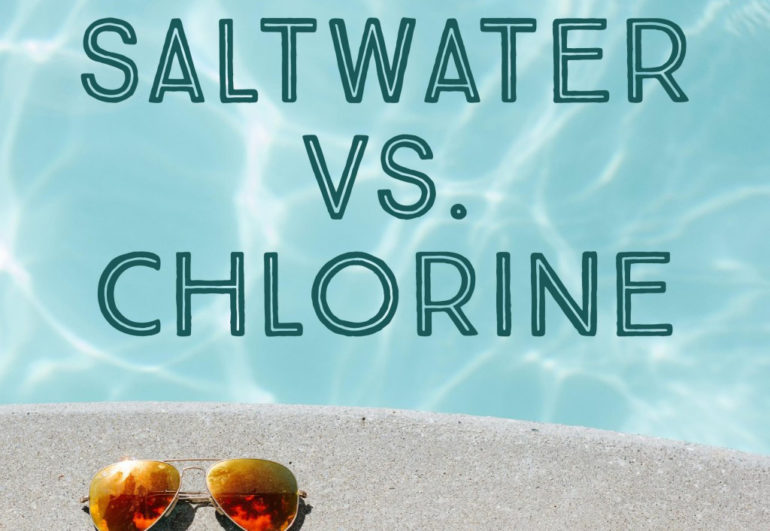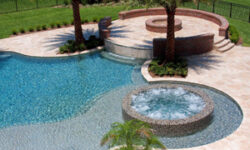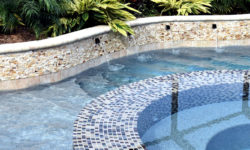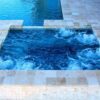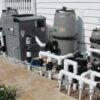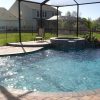If you grew up with a backyard swimming pool, you probably remember a time when your Mom told you she had shocked the pool with chlorine so you couldn't use the pool for a while. Chlorine levels can be tricky to maintain in a traditional chlorine pool.
This is because the traditional system utilizes chlorine tablets. When the tablets are first dissolved, the pool has too much chlorine. Once the tablets are gone, the pool doesn't have enough chlorine. If the pool has a low chlorine level for too long, algae will start to grow, which is what forces the need to shock the pool with high amounts of chlorine. Those high amounts of chlorine burn eyes and turn hair green, which is why pools can't be used right away. This roller coaster level of chlorine is a common problem for backyard pools.
In reality, there are pros and cons to owning either a saltwater pool or a chlorinated pool. By consulting our swimming pool company in Odessa FL, we can help you decide which type of pool would be best for your area and needs.
There are several pros to having a chlorinated pool. While saltwater systems are popular for their low maintenance and consistent chlorine levels, traditional chlorinated pools have their own advantages:
1. Lower Initial Cost
- Chlorinated pools are less expensive to install compared to saltwater systems. The upfront investment for traditional chlorine setups is typically more budget-friendly.
2. Effective Sanitation
- Chlorine is highly effective at killing bacteria, viruses, and algae, making it a reliable option for pool sanitation.
3. Easier Repairs and Maintenance
- Equipment for chlorinated pools is simpler and often less expensive to repair or replace. Saltwater systems, on the other hand, can require specialized parts and expertise.
- Pool owners can manually adjust chlorine levels as needed, providing flexibility to respond quickly to changes in water quality.
- Saltwater can be corrosive to certain pool components, such as metal fixtures, heaters, and pool liners. Chlorinated pools don’t pose the same risk of corrosion, potentially prolonging the life of your pool equipment.
- Chlorinated pools allow for rapid algae treatment using concentrated liquid chlorine or shock. While saltwater pools can address algae, the process may take longer because the system gradually produces chlorine.
4. Wider Availability of Supplies
- Chlorine tablets, liquid chlorine, and shock treatments are readily available at most pool supply stores, often making it easier to find products in a pinch.
5. Suitable for Colder Climates
- Saltwater systems can struggle in cold climates where pool temperatures drop significantly, as the electrolysis process may not work efficiently. Chlorinated pools don’t face this limitation.
While saltwater pools offer convenience and consistency, chlorinated pools remain a practical and effective option for many homeowners due to their lower upfront cost, ease of maintenance, and reliable sanitation. Your choice will depend on your specific preferences, budget, and pool usage.
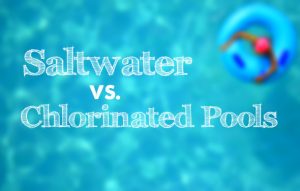 Discover the Benefits of Saltwater Swimming Pool Systems
Discover the Benefits of Saltwater Swimming Pool Systems
However, there are saltwater swimming pool systems that eliminate chlorine issues, and they still use chlorine. They work through the addition of a generator to the pool filtration system.
We can help you with your swimming pool remodeling in Odessa FL, if you are looking for upgrading your chlorine swimming pool to a saltwater pool.
Here's how a saltwater pool works:
Saltwater Introduction: Bags of salt are added to the pool.
Electrolysis Process: The salt dissolves, and the water flows through a special cell where a low-voltage current is applied. This process, called electrolysis, converts the saltwater into hydrogen gas and hypochlorous acid.
Effective Cleaning: The hydrogen gas exits the water as harmless bubbles, while the hypochlorous acid maintains the cleanliness of the pool.
With saltwater systems, the chlorine level is electronically controlled, ensuring a stable concentration even when factors like rain, debris, or high usage occur. For most saltwater pools, maintaining the system requires adding a few bags of salt only once or twice a year—a much simpler and more cost-effective process compared to managing traditional chlorine levels.
Why Upgrade to a Saltwater Pool?
Saltwater systems have several benefits:
- Consistent Water Quality: No more red eyes or harsh chemical smells caused by fluctuating chlorine levels.
- Reduced Maintenance: Spend less time testing and adjusting chemical levels, giving you more time to enjoy your pool.
- Cost Savings Over Time: Although saltwater systems require a higher initial investment, they reduce the need for costly chlorine chemicals in the long run.
Partner with Grand Vista Pools serving Odessa, FL
When you’re ready to enhance your swimming experience, the team at Grand Vista Pools is here to help. As one of the most trusted swimming pool companies in Odessa FL, we specialize in saltwater pool upgrades and other swimming pool remodeling in Odessa FL. With our expertise, you can transform your pool into a low-maintenance oasis that your family will love.
Contact us today to learn more about upgrading to a saltwater pool and experience the difference for yourself!

